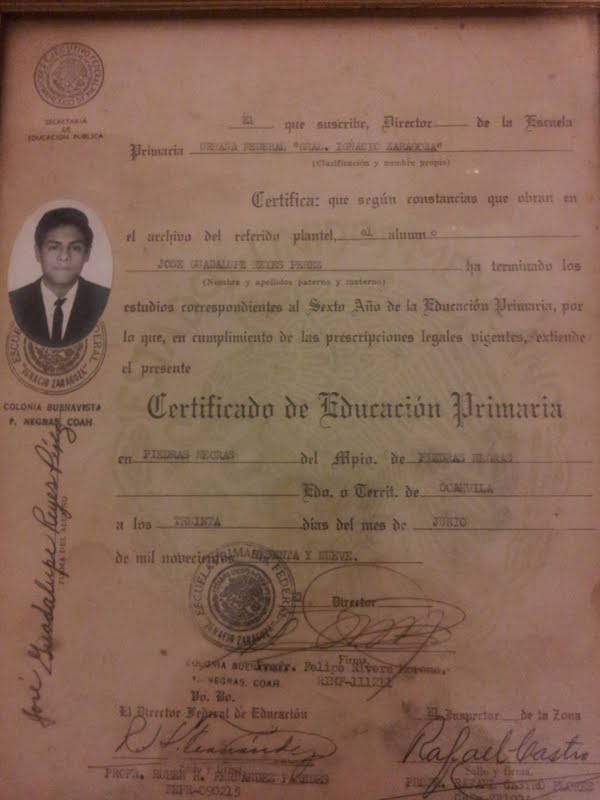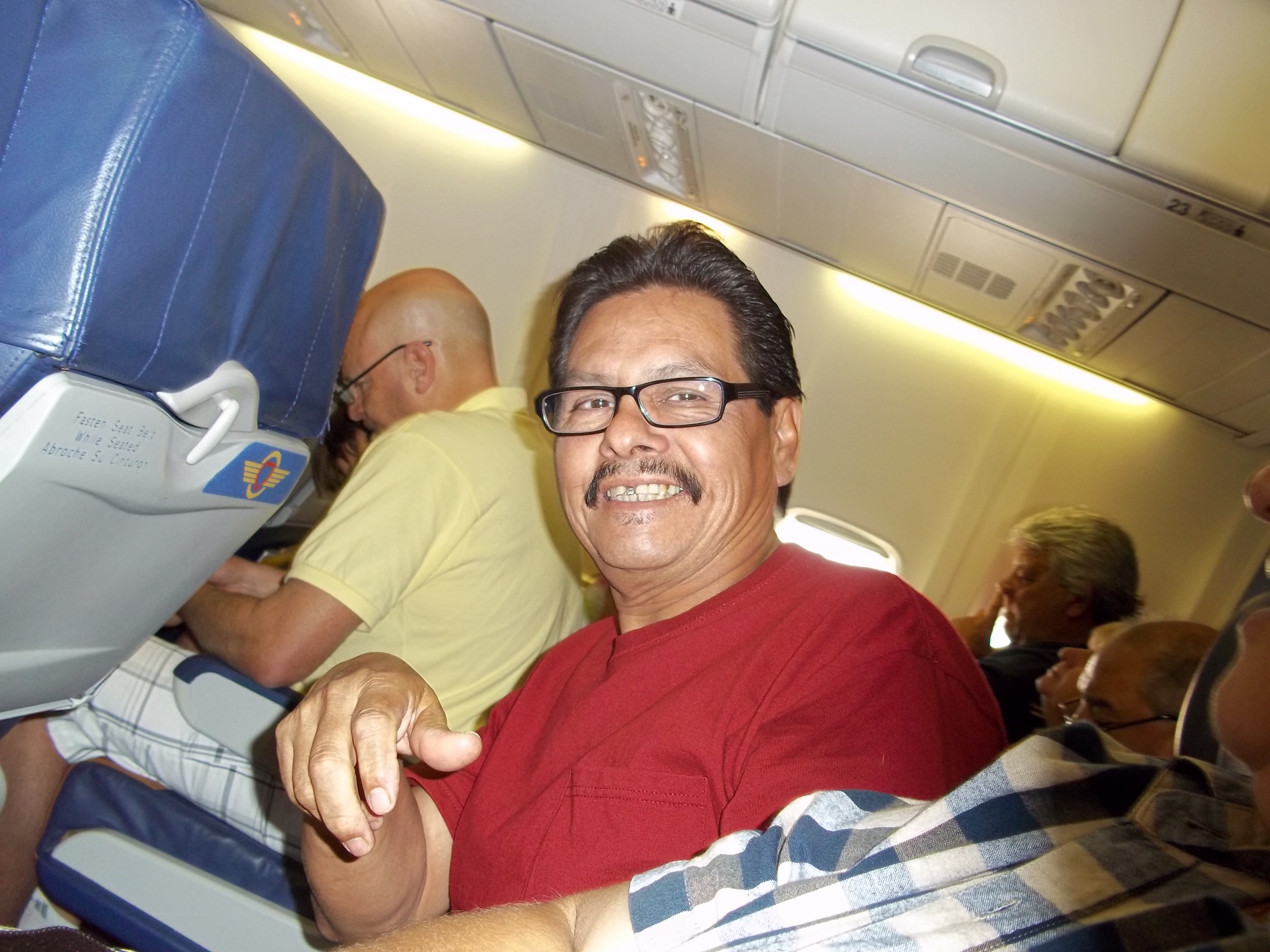TRANSCRIPTION
What do you remember most about Mexico?
We used to play outside and...when I used to go to school, and the homework they used to give me, which was a lot of homework: Friday, Saturday, and Sunday, and when I used to go out with my friends, we would go and eat a raspa, which was in those days, they were 40 cents or 50 cents, which it was in American money, a nickel, you're talking about 1965...a long time ago.
At what age, did you start working?
Probably when I was 12 or 13, I used to go and shoe shine, sell gum in the streets, and sell paletas, and I started working at a shoe store, sold ice, and I worked at a gas station, at Pamex, which is petroleum Mexicano from Mexico.
What did your parents do for a living?
My father used to work where they showed movies, at a movie theater, and he was the one that put the film, so the people can see the movies, and we used to get in the movies for free, we're talking about the 1960's, which was a long time ago.


How far did you in school?
I went to school until the sixth grade, no more, sixth grade in Mexico...that's it.
What was the main reason that made you come to the United States?
The main reason was the money. I wanted a better life for myself, and I wanted to work in the United States, so I could send some money to my parents in Mexico. We were very poor in Mexico.
When you came to the United States, did you come alone? Did you bring someone with you?
No, I came by myself, I crossed the border as an American Citizen which was a lie, but I made it.
How easy was it to cross into the United States back then?
All you had to do was just say you were an American Citizen, and you were free to go.
What was your reaction when you found out you were in the United States?
My reaction was beautiful because I was like Wow I'm in the United States, the most powerful nation in the whole world, and I felt so good that i was in the United States. They treated me really good, and I was very happy being in the United States.


Besides working as a busboy in Arizona, what other jobs did you get while living in the United States?
I moved to Milwaukee, from Arizona, and I started working at a foundry, which works with steel, then I worked at a church, where I was the maintenance guy.
Was it hard to adjust to the lifestyles of the United States?
Well I had to get used to the American way, which was very different from Mexico. All the houses was very different, the jobs, the pay. I used to have a lot of fun with my coworkers, we used to go out, go to the restaurants, going to the movies, and...have a lot of girlfriends too. Everything was beautiful because it was the United States, I feel so nice to be here, and I can't regret it.
Who taught you English?
Well when I moved to Milwaukee, Wisconsin, my coworkers used to be a lot of black people, and theys the one that taught me how to speak the English, which my English is not that good, it's very limit. But my, the one's that taught me how to speak English, was the black people because I used to work with the black people in the foundries.
Did you receive any nicknames?
Actually, yes, my coworkers at the foundry called me "Loopy" because my middle name is Guadalupe, and for some reason they couldn't pronounce the Lu-pe part correctly, so they just called me, Loopy. Right now at Bourdro's, I just go by Joe.
How was it living in Milwaukee?
I've lived in the south the majority of my life, once we hit the north, and saw snow, I felt the sudden change in temperature, something I was not used to. Living in Milwaukee, was both a good and bad time for me, I started a family, everything was good, but at work I was surrounded by death. One of my friends at the foundry had a massive heart attack, and died, as well as the other maintenance man.
Were you involved in any scary situations while living in the United States?
Actually, when I was on my way to Wisconsin, I was laying down in the backseat of the truck, while your uncles drove, as we were driving into St. Louis, MO, there was an immigration checkpoint, and we had to pass through it. My heart started racing because I knew I was gonna get caught, so I had to keep calm. When we reached the checkpoint, the officer asked us questions, your uncles did the talking, when it came down to me, I just replied with "American Citizen" the officer looked over me, and said, "Alright, you guys are free to go."
When did you become an American citizen?
Probably in 1999

How easy was it to receive your citizenship?
It wasn't that easy because I had to study a lot every night after work, and my teachers, the one that taught me to become an American citizen, they used to help me a lot to have the correct answers to the questions, and all that stuff.
How easy was it to cross into the United States back then?
All you had to do was just say you were an American Citizen, and you were free to go.
When did you purchase your first home?
Actually I wouldn't call it a purchase, it was more like renting it, but it was here in San Antonio, on Orange Street, I remember saying, "Wow, a place I could actually call home." Of course, I no longer have that home, but that house will always have a place in my heart. Now I do have a place to call my own, which is of course the house that we live in on E. Villaret, I finished paying it off on March 2008.

Out of all places, why did you choose San Antonio to settle into?
Well your uncles and aunts had moved into San Antonio, As you could tell we were scattered all over the place, you had uncles that lived in Minnesota, Canada, and Wisconsin. One of your uncles moved to Arizona, to be with his wife. Little by little, everyone migrated south, and picked San Antonio, so I followed along, and here I am stil..

Do you feel that if you stayed in Mexico things would be differently?
Oh yes, of course, I used to go and visit my friends back in Piedras Negras, and they tell me that I'm lucky that I left because the situation got really bad over there.
What is your greatest accomplishment so far?
The most thing I'm proud of living in the United States is I have more money to support my family more than the money I used to make in Mexico, which it was really nothing compared to the money I'm making in the United States is good. It make me have a family, have money to buy a house, I have a car, I have a good job, and I feel proud to be an American citizen.
Is there anything else you would like to add to this interview?
Never give up your dreams, aim high for your goals. In the end, your hard work will pay off. Also, I'll send you the bill for this interview in the mail.

